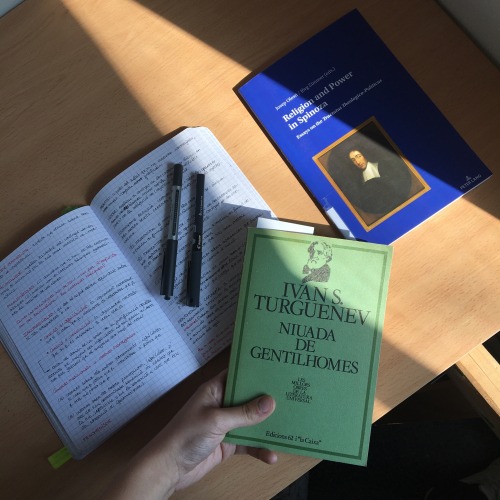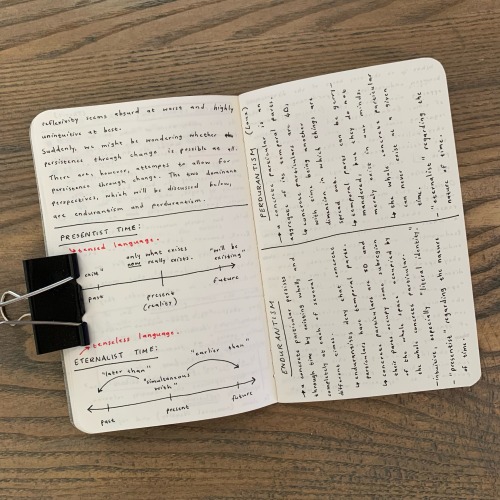
cantbreak-thecycle
17 posts
Latest Posts by cantbreak-thecycle
readings: essays & articles
reassuring ghosts and haunted houses
fish recorded singing dawn chorus on reefs just like birds
what people around the world dream about
poet and philosopher david whyte on anger, forgiveness, and what maturity really means
oranges are orange, salmon are salmon
how memories persist where bodies and even brains do not
the avant-garde musical legacy of the moomins
the weight of our living: on hope, fire escapes, and visible desperation
disturbed minds and disruptive bodies
what is better ー a happy life or a meaningful one?
after my dad died, i started sending him emails. months later, someone wrote me back
on the igbo art of storytelling
what the caves are trying to tell us
promethean beasts — how animal uses of fire help illuminate human pyrocognition
the art of loving and losing female friends
on memorizing poetry
the ecological imagination of hayao miyazaki
reading in the age of constant distraction
holly warburton illustrates tender moments of love and light
romancing the fig: what one fruit can tell us about love, life and human civilization
mystery and birds: 5 ways to practice poetry
can a plant remember? this one seems to — here's the evidence
why female cannibals frighten and fascinate
when you give a tree an email adress
fear not — horror movies build community and emotional resilience
Here's the long-promised Latin resources masterpost! Resource recs are always appreciated and I'll try to update this post from time to time. :)
Study and fluency tips, plus my review of a few different Latin textbooks here
Free online resources here
Suggestions for if you've studied Latin in the past and want to brush up/re-learn here
Tips for expanding vocabulary here
Links for Latin literature and suggestions on which works to start with here
Salvete!





Arranged for your studying pleasure, Charles Bernstein’s POEM PROFILER. Got a poem to study and it’s just too opaque? Found a poem you love and want to write something similar? Want to analyse your own work? The POEM PROFILER is for you!

A very tiresome academic read, and a book I keep by my side for when I can't take it anymore.
Tips for starting a studyblr, then ? Thanks!
I'm glad you asked! Here is a revival of my long ass post heheh
If you haven't already, my first tips is to make an account for your studyblr separate from any other blogs you run.
In terms of posting, I would always recommend posting anything with pictures. They don't have to be great quality or well-edited, start with anything your comfortable with; I find that posts with pics catch people attention better than simple textposts. I you feel like you want to get into editing, start playing around with some editing apps or drawing tools. Another great way to start posting is by taking on a studyblr challenge like the 100 days of productivity or the 30 days of productivity. A short introduction post is also a good idea so that other studyblrs can get an idea of your area of study, age, interests, etc.
When it comes to getting some traffic on your posts, tracking/tracked tags are a great tool to use. In case you haven't heard of them, these are certain tags that are regularly checked by their creators who will boost the posts that have used the tag. My tracking tag is #heydilli and I'll list a couple of others’ tags at the end of this post.
On a similar note, it's really helpful to follow and keep up with other studyblrs. This will help you get ideas for posts and also keep you in the loop about useful resources, new challenges, etc. Some of my fav studyblrs are listed below, along with their tracking tags if they use any:
@myhoneststudyblr (tracking #myhoneststudyblr) @ckmstudies @elysianania @elinordinary @museeofmoon (tracking #heyzainab) @notes-by-saher (tracking #heysaher) @frenchiepal @gushuwa @tranquilstudy (tracking #hiyatranquil) @acaemis @peachblossomstudy (tracking #heypeachblossom on hiatus atm) @rylie-studies (tracking #lookrylie) @rabbitstudy (tracking #heysantiago)
(sorry for the tag y'all but love you!)
So that's about all I can think about for the moment, so hope that helps. Good luck, hope that helped!
xx dilli ❤️

words to use instead of ______
"Very"
Mild: clearly, decidedly, distinctly, markedly, considerably, notably, largely, recognizably, especially, indubitably Moderate: especially, surprisingly, substantially, uncommonly, chiefly, incredibly, obviously, unmistakably, considerably, awfully, wonderfully, particularly Bold: profusely, unequivocally, strikingly, astonishingly, exceedingly, absolutely, exceptionally, extremely, unquestionably, vastly, incontestably
"A Lot" (time)
Mild: often, oftentimes, sometime Moderate: frequently, usually, various, generally Bold: regularly, recurrent, persistent
"A Lot" (size)
Mild: many, much, several Moderate: numerous, bountiful, considerable Bold: multitude, profuse, vast
"Big"
Mild: sizable, ample, large, considerable, great, above average, important Moderate: ponderous, significant, crucial, vast, copious, magnificent, substantial Bold: enormous, immense, colossal, extensive, endless, paramount, boundless, prodigious, imposing, gigantic, voluminous, limitless, essential
"Small"
Mild: slight, limited, trivial, minor, light, puny, superficial, undersized, dinky, negligible, faint Moderate: scant, petite, inconsiderable, microscopic, dwarf, unsubstantial, minimum, miniature, tiny Bold: insignificant, minute, meager, infinitesimal, ineffectual, undetectable, inconsequential
"Good"
Mild: acceptable, favorable, agreeable, pleasing, satisfactory, satisfying, super, able, relevant, accomplished, efficient, reliable, ample, useful, profitable, adequate, adept Moderate: great, honorable, admirable, commendable, sound, splendid, superb, valuable, wonderful, worthy, clever, proficient, qualified, apt, skillful, thorough, wholesome Bold: excellent, exceptional, gratifying, marvelous, reputable, stupendous, superior, exemplary, virtuous, expert, solid, advantageous, flawless, extensive, perfect
"Bad"
Mild: cheap, dissatisfactory, faculty, off, mean, wrong, unpleasant, unwell, low, grim, sour, regretful Moderate: careless, defective, inferior, imperfect, deficient, rough, ill-suited, inadequate, unsatisfactory, delinquent, sinful, unruly, wicked, rancid, grave, harsh, terrible, downcast Bold: awful, unacceptable, corrupt, dreadful, putrid, erroneous, detrimental, ruinous, vile, villainous, diseased, adverse, evil
more words to use instead other words to use instead even more words to use instead
Best language learning tips & masterlists from other bloggers I’ve come across
(these posts are not my own!)
THE HOLY GRAIL of language learning (-> seriously tho, this is the BEST thing I’ve ever come across)
Tips:
Some language learning exercises and tips
20 Favorite Language Learning Tips
what should you be reading to maximize your language learning?
tips for learning a language (things i wish i knew before i started)
language learning and langblr tips
Tips on how to read in your target language for longer periods of time
Tips and inspiration from Fluent in 3 months by Benny Lewis
Tips for learning a sign language
Tips for relearning your second first language
How to:
how to self teach a new language
learning a language: how to
learning languages and how to make it fun
how to study languages
how to practice speaking in a foreign language
how to learn a language when you don’t know where to start
how to make a schedule for language learning
How to keep track of learning more than one language at the same time
Masterposts:
Language Study Master Post
Swedish Resources Masterpost
French Resouces Masterpost
Italian Resources Masterpost
Resource List for Learning German
Challenges:
Language-Sanctuary Langblr Challenge
language learning checkerboard challenge
Word lists:
2+ months of language learning prompts
list of words you need to know in your target language, in 3 levels
Other stuff:
bullet journal dedicated to language learning
over 400 language related youtube channels in 50+ languages
TED talks about language (learning)
Learning the Alien Languages of Star Trek
.
Feel free to reblog and add your own lists / masterlists!
Some readings and resources for further exploration of medieval literature, history, and art
"The Canterbury Tales" by Geoffrey Chaucer
"Beowulf" translated by Seamus Heaney
"The Song of Roland" translated by Dorothy L. Sayers
"The Divine Comedy" by Dante Alighieri
"The Decameron" by Giovanni Boccaccio
"The Book of Margery Kempe" by Margery Kempe
"The Lais of Marie de France" translated by Glyn S. Burgess and Keith Busby
"The History of the Kings of Britain" by Geoffrey of Monmouth
"The Mabinogion" translated by Sioned Davies
"The Romance of Tristan and Iseult" translated by Joseph Bédier
In addition to these literary works, here are some resources for further exploration of medieval history and art:
"A Short History of the Middle Ages" by Barbara H. Rosenwein
"The Civilization of the Middle Ages" by Norman F. Cantor
"The Time Traveler's Guide to Medieval England" by Ian Mortimer
"The Oxford Illustrated History of Medieval Europe" edited by George Holmes
"Medieval Art" by Veronica Sekules
"A Medieval Life : Cecilia Penifader and the world of English peasants before the plague" by Judith Bennett
"The Oxford Handbook of Women and Gender in Medieval Europe" by Judith M. Bennett, Ruth Mazo Karras
The Metropolitan Museum of Art's collection of medieval art and artifacts
The British Library's collection of medieval manuscripts and documents
The Medieval Academy of America's resources and publications on medieval studies
The International Center of Medieval Art's resources and publications on medieval art
These resources should provide a good starting point for further exploration of medieval literature, history, and art.
hii you posted you are relearning latin, just from school book notes or are you also using other sources?
hi i use a mix of things! i use my notes and textbooks from school a lot, but i also use free online resources and try to read books in latin too

textbooks:
cambridge latin course books i-v (clc has free online resources if you can't buy them, here and here)
online resources / courses:
openlearn: getting started on classical latin
openlearn: continuing classical latin
openlearn: discovering ancient greek and latin
openlearn: introducing classical latin (i only use this one for pronunciation reminders)
national archives: medieval latin
misc:
list of modern books with latin translations

there are probably lots of other ways to learn it and other free resources, but this is what i use. hope this helps!

AP Psychology notes + Resources and stuff
notes + flashcards that I used 2 study (not all my resources, found online)
Notes
Summary of every unit (16 pages)
A longer summary of every unit (53 pages)
Knowt AP Psych Guide
Doc for Notes
Unit 1 Notes - Intro to Psychology
Unit 2 Notes - Biological Psychology
Consciousness/Drugs Notes
Unit 3 Notes - Sensation/Perception
Unit 4 Notes - Learning
Unit 5 Notes - Cognitive
Intelligence Notes
Unit 6 - Developmental Psychology
Unit 7 - Motivation/Emotion/Stress
Personality Notes
Unit 8 - Disorders
Clinical Treatment Notes
Unit 9 - Social Psychology Notes
Flashcards
Quizlets
Important People
Domains of Psychology
Terms
Experiments
Knowt
AP Psychology Ultimate Guide
AMSCO AP Psych Chapters
Ch. 1 - Intro to Psychology
Ch. 2 - Research Methods
Ch. 3 - Statistics
Ch. 4 - Understanding the Brain: Its Structures and Functions
Ch. 5 - Neurons, Neural Communication, and Behavioral Genetics
Ch. 7 - Perception
Ch. 13 - Motivation
Ch. 15 - Infancy and Childhood
Ch. 16 - Adolescence and Adulthood
Ch. 17 - Personality Theories, Approaches, and Assessment
Ch. 20 + 21 - Abnormal Behavior
Ch. 22 + 23 - Treatment of Abnormal Behavior
Ch. 24 + 25 - Social Psychology
Websites
Fiveable Study Guides for each unit
Youtube - Tim Steadman
Youtube - The School of Ireland
Youtube - Crash Course Playlist - Psychology Playlist
Youtube - Mandy Rice
Youtube - College Board - AP Psychology Playlist
Youtube - Social Science Simplified
AP Psychology Reddit
Other Tumblr blogs with more resources!
@ap-psych-ology
@nuroscience




yes fantasizing about your crush is fun, yes scrolling through your phone is fun. But do you know what actual fun is ? It is getting the grades you want, it is getting the university you can't stop dreaming about, it is getting the course you put hours working on. And the only way to get them is by studying hard. No you don't have to be extreme and lost sleep, all you need is dedication and discipline. So get the fuck up and start working for it.


8/26/22- first week back on campus!!
i have the same professor in two different classes, so i'm seeing her every day and i'm honestly afraid i'll submit work for the wrong class bc they just blend together into a mega-class in my brain

i’m taking ap english language and composition this year (school starts in t h r e e days ahh!!!), so i figured i’d make a masterpost of resources and tips for my own reference + to help u guys out!
01 // advice people have given me:
take really good notes!!! you’re going to need them
read all required reading. do NOT use sparknotes or anything like that because you will miss all of the little details that are essential.
buy the barron’s prep book (it’s the best one)
learn to annotate properly because it’s another skill necessary for this class
take notes in a dialectical journal format like this one here
02 // reading list for my school + online pdf of each book
The Great Gatsby by F. Scott Fitzgerald
Adventures of Huckleberry Finn by Mark Twain
Their Eyes Were Watching God by Zora Neale Hurston
The Grapes of Wrath by John Steinbeck
Catcher in the Rye by J. D. Salinger
The Scarlet Letter by Nathaniel Hawthorne
The Crucible by Arthur Miller
One Flew Over the Cuckoo’s Nest by Ken Kesey
03 // links from authorities on the subject
Collegeboard ap english language and composition home pagge
Collegeboard exam practice
Ultimate list of tips
Guide to the exam
Free diagnostic tests
Synthesis essay rubric
Test score calculator
Another essay rubric
Quizlet flashcards
More flashcards
Exam prep
04 // apeng specific studyblr posts
Exam tips by @memorisu
A bunch of tips by @studics
A masterpost I made a while ago with a bunch of links
Some more links by @nothingadventured-nothinggained
Rhetorical analysis: strong and weak verbs by @gryfhindor
How to write a rhetorical analysis essay by @scissorstudy
A few more links by @chemlstry
Ap lang vs ap lit + exam tips by @novanovelist
More tips by @sabitcher
Review posts by @scholasticwhimsy
Practice materials by @thegrapesofangst
How to study for the exam by @byologee
Writing the essays by @byologee
Exam packets and resources by @apbymichelle
How to study by @darthmvthensis
Exam format by @carmiestudies
Exam study resources by @darkmvthensis
ap rhetorical devices part 1 by @carmiestudies
More misc links by @studaeing
05 // my favorite english/writing posts
Websites for writing essays by @intellectys
Tips for time essays by @fuckstudy
How to annotate a novel by @englitstudent
How to write conclusions by @rewritign
Using the p-e-e-l method for essays by @iverdiatur
Annotating + taking notes from literature by @noteology
Annotating effectively by @hideandstudy
Academic writing masterpost by @thescholarlysquad
Academic writing resources by @nimblesnotebook
How to write an essay by @captainnaustralia
Literary analysis by @antigonick
and that’s all I have for you! thank you for reading, and good luck to everyone taking this class 💖💖💖








